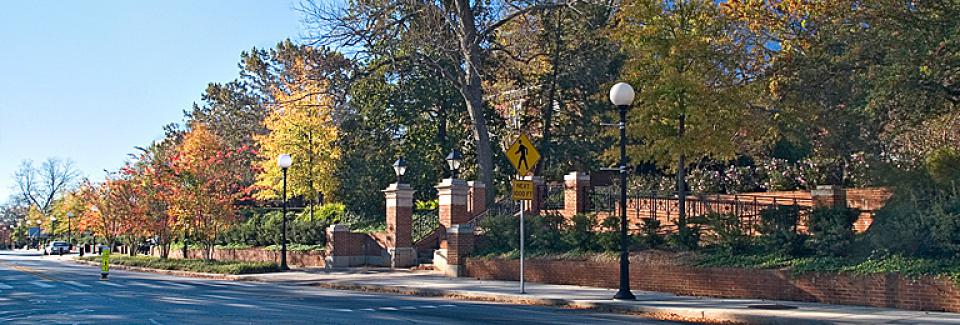
The GIS Mapping project is an initiative by Finance & Administration to document the University's changing physical campus. One of the first databases of its kind, the GIS project began in 1992 and has been operated by the Office of University Architects (OUA) since 1996. Under OUA's leadership, the GIS database now forms the foundation for UGA's campus planning and development activities.
With continually updated information, the GIS database has become a critical tool in the planning and development of UGA's main campus and outlying properties. The University of Georgia comprises over 40,000 acres of geographically diverse landscapes, from the Barrier Island Research and Learning Center on Sapelo Island to the Georgia Mountain Research and Education Center in Blairsville. The base maps that are generated by the GIS Mapping project document the built and natural environments including buildings, natural and cultivated landscapes, roadways and parking areas, infrastructure and utilities, and more. These maps have become a primary means by which campus planners study the interdependence and complexities of UGA's built and natural environments.
Since the project began in 1992, the level of detailed information recorded in the GIS database has continually increased. Over 2000 University buildings have been mapped on 100 properties and in 34 Georgia counties. Through collaborative effort with the UGA Grounds Department, 1,245,657 linear feet of utility lines and 12,125 utility point features are recorded including detailed attribute information regarding size, type and data source of each specific item. Each parking space, bike rack, bench and memorial on the main campus is also included in the vast database. The GIS-mapped campus landscape documents types of vegetative cover over the entire UGA main campus, including the diameter and species of notable arboretum trees. In addition to the data collected on UGA property, OUA staff has compiled information from county GIS departments and Internet sources to depict UGA properties in context. Aerial photography of all campus properties and digital photos of UGA buildings and campus features have also been compiled. All of this data is stored in one main GIS mapping database, making access more user-friendly.
Efficient and timely data sharing is available to UGA students, faculty and staff through the Interactive Campus Map on the OUA website (www.architects.uga.edu). Through the new statewide mapping database, multiple users throughout campus and beyond can view core data and create their own maps on their own computers. This change has reduced data redundancy by allowing all users to access the core data stored in the Office of University Architects through the UGA intranet. The integrity of the accessible GIS data is improved by the use of accurate data sources and by working closely with other campus departments. The University Physical Plant Grounds and Engineering Departments, Horticulture Department, Enterprise Information Technology Services, Parking Services and Campus Transit all provide detailed data to facilitate mapping updates.
